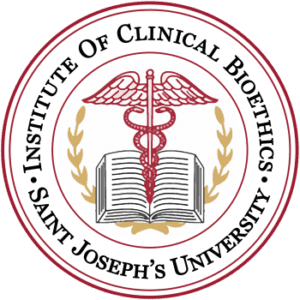The Institute of Clinical Bioethics has started a new Therapeutic Horticulture project at McAuley Convent modeled after our project at Manresa Hall. Fellows volunteered their time over the summer to start this project, including some of our Associate Fellows. Three of our Associate Fellows, Chiarra Mazza, Cole Pizzo, and Amanda Yu, shared reflections on their time with the Sisters.
Chiarra Mazza
Working and interacting with Sisters dealing dementia has been both a challenging and rewarding experience. So far, we have planted herbs with the Sisters and will continue to engage in such activities that provide a meaningful way to connect with them and observe their progress. One of the main challenges has been finding ways to communicate and engage with each individual effectively, as their cognitive abilities are limited. However, witnessing little moments of joy and accomplishment has been incredibly rewarding. I can already foresee that this experience will profoundly impact me by teaching me patience, empathy, and the importance of creating a supportive environment for those with dementia. It has also highlighted the significance of simple, everyday activities improving the wellbeing of these women.
Cole Pizzo
Prompted with the topic of decreasing the expeditious nature of dementia, I engaged with this concern committed myself to a research project hosted by Saint Joseph’s University. However, this is not to say that prior to June 15th, the topic of aiding these individuals through horticultural techniques seemed ambiguous to me. This past session of Therapeutic Horticulture at McAuley Hall with the Sisters of Mercy made me truly reflect and appreciate the opportunities and knowledge this project grants.These nuns have altered my view of what this disease truly is. Just after three sessions, I gained a much better understanding of what dementia is, how it can be identified, and why horticulture is being tested as a noninvasive way of helping these individuals. Early on, I was paired with Sister Lucy. Hearing about her high school prom, career as an AP History teacher, and her journey of sisterhood opened my mind to understanding that dementia is not limited to forgetfulness.
Amanda Yu
Day one was interesting as I had been paired up with sister Kathleen. Chatting and laughing the time away, Sister Kathleen and I “got our hands dirty” as we began planting herbs in flower beds, all while unhashing memories. Keeping the spirit of conversation and horticulture alive, on day two we created bundles of lavender, lining up each flower with care, Sister Kathleen and I then wrapped our lavender bouquet and hung it to dry. As the session came to an end, Sister Kathleen asked me to push her wheelchair to her room. While navigating me to her room, she thanked me for spending the morning with her and made reference to her outlook on life as she talked about the very few things she had left. This moment made me realize this project’s effect on the Sisters of Mercy, not just because of its scientific value, but the emotional engagement it provided them.

